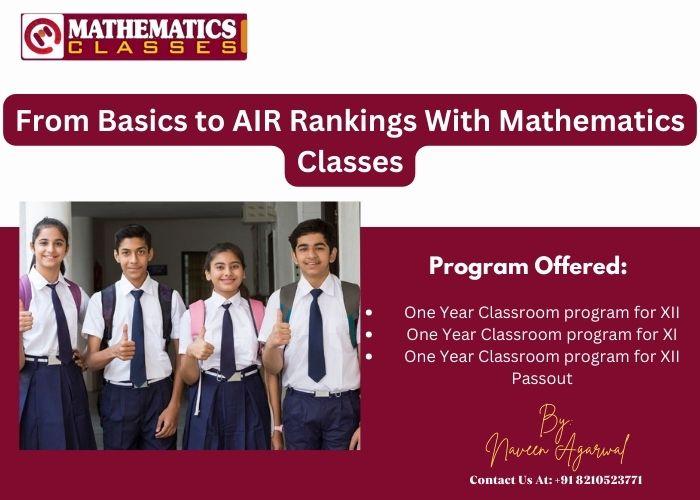Basics to AIR Rankings: Mathematics Classes
Mathematics education plays a crucial role in achieving high AIR (All India Rank) in competitive exams. As students embark on their journey to excel in these assessments, a strong foundation in basic mathematical concepts becomes paramount. Let's delve into the key aspects that contribute to success, from mastering the basics to navigating complex problem-solving scenarios.

The Importance of Mathematics Education in Achieving High AIR
In the competitive landscape of exams like JEE, NEET, or SAT, mathematics forms the backbone of analytical thinking and problem-solving skills. A solid understanding of mathematical principles not only boosts confidence but also enhances cognitive abilities necessary for tackling challenging questions.
Importance of a Strong Foundation in Basic Mathematical Concepts
The importance of a strong foundation in basic mathematical concepts cannot be overstated. Mathematics is not just a subject; it's a fundamental skill that forms the backbone of various disciplines, from science and engineering to economics and finance. Here are several reasons why having a solid grasp of basic math is crucial:
-
Building Blocks for Advanced Learning: Basic mathematical concepts such as arithmetic, algebra, geometry, and calculus serve as building blocks for more advanced topics. Without a clear understanding of these foundational principles, students may struggle to grasp higher-level concepts effectively.
-
Enhanced Problem-Solving Skills: Mathematics teaches logical reasoning and problem-solving techniques. By mastering basic concepts, students develop critical thinking abilities that are invaluable not only in academic settings but also in real-world scenarios. They learn to analyze problems, formulate strategies, and derive solutions—a skill set applicable across various domains.
-
Confidence and Competence: A strong foundation in math breeds confidence. When students feel comfortable with basic mathematical operations and concepts, they are more likely to tackle complex problems with enthusiasm and accuracy. This confidence is essential for academic success and future career endeavors.
-
Prerequisites for Advanced Courses: Many advanced courses in science, technology, engineering, and mathematics (STEM) fields have prerequisites rooted in basic math. Without fulfilling these prerequisites, students may face barriers to accessing higher-level coursework and career opportunities in STEM-related fields.
Benefits of a Step-by-Step Progression in Learning Mathematics
A step-by-step progression in learning mathematics offers numerous benefits that contribute to a deeper understanding and mastery of the subject. Here are some key advantages:
-
Comprehensive Understanding: Breaking down mathematical concepts into manageable steps allows students to grasp each concept thoroughly before moving on to the next. This sequential approach ensures a more comprehensive understanding of the subject matter, reducing the likelihood of gaps in knowledge.
-
Building Strong Foundations: Just like constructing a sturdy building requires a solid foundation, mastering basic concepts before advancing to more complex ones is crucial. A step-by-step progression ensures that students build a strong mathematical foundation, which is essential for tackling advanced topics with confidence.
-
Progressive Skill Development: Learning mathematics progressively enables students to develop their skills in a structured manner. They start with basic arithmetic operations and gradually move on to algebra, geometry, trigonometry, calculus, and beyond. This progression helps in honing problem-solving skills and analytical thinking abilities over time.
-
Increased Confidence: As students successfully navigate each step of their mathematical journey, they gain confidence in their abilities. Mastering one concept before moving to the next instills a sense of accomplishment and encourages students to take on more challenging problems with enthusiasm.
Testing Problem-Solving Skills in Competitive Exams
Competitive exams are designed to assess not just knowledge but also problem-solving abilities. Questions often require critical thinking, application of concepts, and innovative approaches. By familiarizing themselves with various problem types and practicing diverse problem-solving strategies, students can perform exceptionally well in these exams.
Role of Personalized Guidance and Mentorship
Personalized guidance and mentorship play a pivotal role in a student's mathematical journey. Mentors provide tailored support, address individual learning styles, and offer insights that go beyond textbooks. This personalized approach can significantly boost confidence and performance.
Emphasizing Regular Practice and Revision
Emphasizing regular practice and revision is fundamental to success in learning mathematics courses for jee advanced. Here are several key reasons why these practices are crucial:
-
Boosting of Concepts: Regular practice reinforces mathematical concepts and skills learned in class. It helps students retain information and prevents forgetting, ensuring that foundational knowledge remains strong.
-
Improvement of Problem-Solving Skills: Mathematics is all about problem-solving, and regular practice enhances these skills. By solving a variety of problems consistently, students become adept at applying different techniques and strategies to tackle challenges effectively.
-
Enhancement of Speed and Accuracy: Practice leads to increased speed and accuracy in solving mathematical problems. As students practice regularly, they develop fluency in calculations and methods, which is essential in timed exams and real-world applications.
-
Identification of Weak Areas: Through regular practice, students can identify areas where they struggle or make mistakes. This self-assessment helps in focusing efforts on areas needing improvement, leading to targeted learning and skill development.
-
Building Confidence: Practice builds confidence in students' abilities. As they solve more problems and encounter various scenarios, they gain confidence in tackling different types of questions. This confidence is crucial in approaching exams and challenging problems with a positive mindset.
Significance of Tracking Progress Through Regular Assessments
Regular assessments are invaluable tools for tracking progress. They provide feedback on strengths and areas needing improvement, allowing students to adjust their study strategies accordingly. Monitoring progress through assessments helps students stay on track towards achieving their goals.
In conclusion, a comprehensive approach to mathematics education, encompassing a strong foundation, step-by-step progression, problem-solving skills, mentorship, regular practice, and progress tracking, is key to excelling in competitive exams and attaining high AIR rankings.




